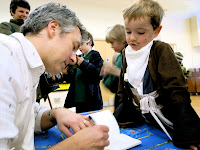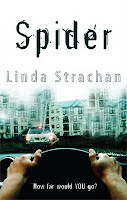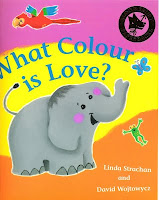Here's a radical proposal - one to shock my fellow writers to the core. (This is my first ABBA post so I thought I'd kick off with some controversy.) I love writing. I want the children I meet to love writing too. But sometimes when I'm in schools, with my Visiting Author hat, I find the experience bitter-sweet. Why?
Because although the children I meet love hearing stories, acting out stories and inventing new stories, often the whole process of "writing down" the stories is still painful for them. I work mainly in primaries and even in Year 6 this is still the case for some children. Sometimes reading stories - the same stories that they love to hear - is a struggle too.
Children should read. It is the key that unlocks their educational future. It is also one of the greatest (and cheapest, most convenient and therefore most widely accesible) pleasures in life. Yet for many primary age children reading is not pleasure. It is dull - all about deciphering, not romping through a story.
We could get side-tracked into some educational debates here. But one thing that strikes me more and more: English is HARD. Learning to read and write is DIFFICULT.
No, you say. Surely it's as easy as One, Two, Three...A,B,C.
Well, just think about that. Most British children today learn using phonics, and a lot of them make rapid progress, sounding out the words. Until they reach the Tricky Words. One and Two are Tricky Words. Just look at them. They make no sense. You know how to pronounce them only because you have learnt them as individual words. The trouble is so many words are tricky. Such basic words as I and You and Me and There and Their and Go and Come and Who and....Sausage. All tricky. I could go on.
It doesn't have to be this way. In Italian all words are phonetic - their spelling is consistent with their sound. In fact, I'm told in Italian there is no word for Spelling! Think of that - and think of the time freed for more exciting things.
Maybe it is time to reform the English language - the spelling of it, anyway. Then there would be fewer seven, eight, nine year old children who although they have the ability to appreciate the compex dialogue and storyline of a film like Shrek are still struggling their way through The Gingerbread Man when it comes to the written page. Or who can't wait for the next instalment of The Twits when their teacher reads it to them (all children love Roald Dahl is the motto of every primary teacher) but can't manage to read the book themselves.
Of course it would be a bit of a downer for all of us old(er) folks who find One, Two, Three as obvious as falling off a wall. But wouldn't it be worth it to let more people in?
OK, time for the brick bats!
Viewing: Blog Posts Tagged with: authors in schools, Most Recent at Top [Help]
Results 1 - 4 of 4
Blog: An Awfully Big Blog Adventure (Login to Add to MyJacketFlap)
JacketFlap tags: reading for pleasure, authors in schools, Emma Barnes, Add a tag
Blog: An Awfully Big Blog Adventure (Login to Add to MyJacketFlap)
JacketFlap tags: book signings, John Dougherty, authors in schools, Add a tag
 I love doing school visits.
I love doing school visits.
I love writing, too, but it would drive me mad if I spent all my waking, or at least working, hours alone in my shed. I like - no, I need - to get out there and perform, too.
I’ve been doing a lot of it lately. I suspect it’s proximity to both World Book Day and the end of the financial year that leads to the annual rash of bookings throughout late February and much of March; but whatever the reason, it’s been great to get out of the confines of my admittedly lovely shed and meet both children and staff at a real variety of schools, from Gloucester to Bedford and from Leicester to Exeter.
There’s always the occasional niggle in school visit season. Inevitably, at some point, somebody at some school somewhere will do something to cause offence. When this happens, it’s important to keep things in perspective. What was said may not have been exactly what was meant; that omission was probably a genuine oversight; teachers are busy people who should be forgiven for not always being able to keep every single plate spinning. Yes, I’ve just driven for two hours to get here; but she may have spent the last forty-five minutes trying to control an uncontrollable Year 5. And, of course, while the best school visits - the ones where the children have been prepared for my visit and are excited about meeting a Real Live Author - are also usually those on which I get treated like a celebrity, it’s important not to let that go to my head and expect the red carpet treatment everywhere.
There was, however, one niggle from this round which has stayed with me, and I really don’t think this one is down to me being a diva (or whatever the masculine form of diva is. Div, probably). You see, I always finish my school visits with a book signing. Yes, it’s good to earn a little extra income from selling books - most of us aren’t terribly well-off - but that’s not why I do it. Nor is it to soak up a little more adoration - very often it’s when they meet you one-to-one that they say something that brings you back down to earth. No, the book signing is much more important than that.
You see, I always finish my school visits with a book signing. Yes, it’s good to earn a little extra income from selling books - most of us aren’t terribly well-off - but that’s not why I do it. Nor is it to soak up a little more adoration - very often it’s when they meet you one-to-one that they say something that brings you back down to earth. No, the book signing is much more important than that.
More than anything else, the reason I do school visits is to promote reading for pleasure. I’m passionate about it. I believe that a school - especially a primary school - that doesn’t at least try to get its pupils reading for pleasure is failing in one of its most important duties. And in my sessions, I do my utmost to link reading and fun.
For me, the signing session is an important way to do that. If a child has been inspired by the day, and is bursting with fresh enthusiasm about reading, it’s good to provide the option of a focus for that enthusiasm; and a book signed by The Author can be just the thing. It can become a treasured, even a totemic, item, invested with significance.
Obviously, not every child will need such a focus - many of them will have books at home that already have particular significance, and for many some all books will be equally special, signed or not. But the signing session means that children are at least offered the option of buying a book which, for some, will be their first Special Book - and, for some, might even be their first book of any sort.
So what’s my niggle? It’s that one o
Blog: An Awfully Big Blog Adventure (Login to Add to MyJacketFlap)
JacketFlap tags: Libraries, publishers, authors in schools, Penny Dolan, Add a tag
Imagine, somewhere, a play on a stage. It may not have been the success hoped for. The people – the actors, the director, the playwright, the producer, the backstage crew and more - can all blame each other, as well as the media. Same for films, other than more names to blame.
Now think about the book and its author. It may not have been entirely the success everyone hoped for. True, there are things like fonts and layouts and covers to grumble about - and how - but it’s the author’s own words that appear naked on the page.
Once a book is done, an author can’t say, “Well, that character really messed up that scene, didn’t they?” Or “Who the hell put that set together?” Or “It’ll probably settle down by the end of the week.”
So when an Ordinary Author starts to feel their beloved book-baby has turned into the most unlisted, un-nominated, un-awarded, un-read title around, they’ll also feel it’s partly their fault. They held up their words for all the world to see, didn’t they? They raised their own particular voice. The author stands out there alone on the wide white page. “It’s all me, me, me!” has a different feel when one’s own words appear on the line.
No wonder Ordinary Authors act needy or easily hurt at times. No wonder some have mightily tetchy days, weeks or months. No wonder that they only recall the unfavourable phrase in a review, or the space where the third-fourth-fifth star should have been.
Nor should it be a great surprise that – just sometimes – Ordinary Authors feel scraped raw sidling past rows of bookshop shelves where their work is not available. Even the slightest jealousy makes for hot iron shoes, not soft comfy slippers. All that’s there – or not – is the Ordinary Author and the book what they wrote.
So, with World Book Day Week coming up, if you have an Ordinary Author booked into your school and all the usual admin is in hand, here are a few thoughts on how to welcome your visiting author, and get a better visit because of it. You probably know all this already, but just in case . . .
Ordinary Author’s Work. Do get hold of a copy or more of the author’s books before the very day. Try and read at least some of the book aloud to the classes. Don’t just hold up the cover in assembly. Authors get used to talking in schools where the children know nothing about their books, but it makes the task that much tougher.
Ordinary Author’s Book Sale – Yes! Please do organise a sale of the author’s books, preferably through your local children’s bookshop, supplier or publisher. Promote the fact their books will be on sale. Collect in orders beforehand so the author can sign the books while they are there. Why is this important? Book sales don’t bring authors great riches. They don’t end up with bags of gold, honest. Each sale brings around 5% of the cover price or less, which probably goes to paying off an advance, but sales tell publishers that their author’s books are worth printing and reading. Surely you wouldn’t have asked the author in if it wasn’t so? In the current climate, those sales might make a publishers take a future title instead of cutting your author abruptly adrift.
Other Author Book Sales – No! Please don’t have your Ordinary Authors book sale in the same fortnight as those huge “Book Fair” crates, even if you use the money to support the visit. What do you think it feels like having the books you’ve just been talking about run fifth place to the reams of semi-remaindered authors, television tie-ins, glittery pen sets and pink pop-star diaries? Fair or unfair?
Ordinary Author Displays. Not essential but nice. Put up a display somewhere about your visiting author. It’s far easier if you know their work and have looked at their website. Believe m
Blog: An Awfully Big Blog Adventure (Login to Add to MyJacketFlap)
JacketFlap tags: teenage novel, Linda Strachan, authors in schools, Add a tag
For me writing involves getting inside my characters almost in the way you might pull on a costume.Getting right inside their head and going through the emotions as they feel them, which is exhausting at times but it is such an important part of it that there are times I find myself wondering if I really want to dive right in there.
It is a little like going into the sea when you are not sure if the
water is perhaps just a bit too cold. The tentative dipping in of a toe, or just letting the water wash around your ankles until you feel brave enough to totally immerse yourself into the brisk, fresh sensation.
I started off writing books for quite young children, mostly warm and cuddly or just fun stories where at the worst the child, animal or childish character might become a little concerned, perhaps scared by the dark or be upset by being lost, but it quickly turns out well and happy.
I had avoided writing for teenagers for a long while, I think because the
thought of revisiting the angst of being a teenager never really appealed and I was worried because I wasn’t sure if I could, or would want to, relive the experience even from a character’s point of view.
I wonder if other writers feel the same and are wary of the emotional rollercoaster that their character might take them on? I now find myself writing rather dark books for teenagers, dipping into their most difficult times and giving my characters a truly hard time.
I think I am quite an upbeat and happy person normally, so where does that come from?
W hen I go into schools I often have the strange experience that in the morning I might be speaking to tiny nursery children, with lots of fun and cuddly toys as props, or slightly older ones with Hamish McHaggis and friends.
hen I go into schools I often have the strange experience that in the morning I might be speaking to tiny nursery children, with lots of fun and cuddly toys as props, or slightly older ones with Hamish McHaggis and friends.
In the afternoon I might be facing a room full of young adults talking about the harshest things in life, death, injury, knives, blood and impossible decisions.
I have to admit that I enjoy the variety and challenge and I wouldn’t have it any other way. It is one of the things I love about what I do and it makes my life so varied – it never gets dull - just a bit hectic at times!
So whether it is sitting at my desk about to start writing or preparing for an author visit I find myself asking the question – Who shall I be today?
Linda's website is at www.lindastrachan.com



Well, you're in such splendid literary company as that of Bernard Shaw, Emma, so no need to duck!
Personally I won't join you on that particular barricade, for the (perhaps selfish) reason that I love the way English spelling acts as a kind of fossilizing device, telling us about where words have come from, how they used to be pronounced, and so on. I think reading would lose one of its dimensions were that to be flattened out.
Then there's the question of whose pronunciation you would choose. Would you keep the 'r' in word, because it's pronounced in America and the West Country, or drop it because it's not used in RP? Once you start privileging one group of speakers it all gets very political!
Charlie, I take your point, but all this historical linguistic richness comes at a price - which is that it excludes a lot of children (and adults) from the joy of fluent reading. "Fossilizing device" you say - surely language is about communicating, not "fossilizing.
And regardless of whose pronunciation you chose, at least a new system could be CONSISTENT.
I'm a bit worried about Bernard Shaw though...didn't know I was following his footsteps!
I quite take your point about the price in terms of literacy - which is why I admit my motives are selfish! Perhaps 'fossilizing' was the wrong word, though, if it suggests something dead. More like being able to look at the rings on a tree, or even the wrinkles in the face of a friend (or - egad - the mirror!). I think people are only too apt to ignore the past, and my hackles instinctively twitch at any move that seems likely to make that easier.
You mean you don't know about "ghoti spell fish"?
Can't join you either but that's because I am one of the fortunate ones who can spell and never have a problem with words.Like Charlie, I like seeing where a word comes from by looking at it how it's spelt,
HOWEVER, phonics is NOT the best or only way of teaching phoneme-grapheme correspondence in a language like English. As you say, "sounding out" doesn't work for lots of very common words.
I am utterly with you there.
I do see your point, Emma, I really do. Wasn't there an attempt to do something like this with the Initial Teaching Alphabet? The trouble with that, I guess, was that it just staved off the evil moment when you had to come to grips with stadard English spelling - I've talked to people who learned to read and write with this method and felt very betrayed by it, because they never did learn how to spell properly.
Think of what you're asking! Think of the zillions of people all over the world who use English - think of all the books and documents and articles! How could you possibly organise it so that everyone would switch? And even if you could - wouldn't that eventually render obsolete or of only esoteric interest all the literature etc we already have?
It wouldn't matter so much if everyone became literate in the end - but a lot of people don't. And it seems to me that if you are not a fluent reader by 8 or 9 then the gulf between your reading abilities and your interests becomes wider and wider and the problem harder and harder to solve. Which is why an easier language would help.
Sue, I am dreaming of computer programmes that could translate all the existing books into the new language...could it be possible?
Interesting post!
Actually even a relatively logical language like Italian does break the rules with many common words. Italian pronounciation is not always regular. Words like anatra (duck) have unusual stresses. And I believe there is a word for spelling in Italian - l'ortografia.
I agree with you that anything that throws down a gauntlet CAN discourage young readers, but, with the right kind of teaching and encouragement, children CAN take up the challenge. For myself, these days, when I come across a strange new Italian pronounciation, I allow myself an enjoyable expostulation or two against the cruel fates that made it that way, and then tuck it into my vocabulary.
In English, I also like the look of clotted unusual, irregular, spiky words on the page. A standardised phonetic spelling would smooth all that out, I fear.
Yes , its a horror teaching children to spell and I taught kids with special needs for 25 years. They really suffer. But ita was another horror invented too. Unfortunately ( or fortunately) English is a rich and historical language that has developed into a nightmare of rules/ unrules and downright cussedness. But I have never found an easy way for kids to learn it. They just have to solider on.
However - that doesn't mean to say they should not be enjoying books, poems, words in all their glory in school. I've taught Ted Hughes' poem, The Midnight Fox, to kids with moderate learning diffs., and they absolutely loved it and engaged with it in their own amazing ways. All of English belongs to everybody. ( Gosh, didn't mean to rant on and well done for doing your first ABBA post!!!!)
How annoying, I wrote a very long post and Blogger has eaten it. I haven't the energy to type the entire thing out again, but I disagree with you completely and utterly. Welcome to ABBA!
the spaesmen hav landid in the see ov trankwility.
I'm an editor (who, by the way, wasn't too hot on spelling as a child), so I'm veering the other way to you on this, Emma.
There is a wonderful, beautiful, clever, literary adult novel that explores this theme - and so much more... "School is finished for the summer and last night, 20 July 1969, two men landed on the moon."
It is called Cryers Hill and is by Kitty Aldridge. I recommend it to everyone interested in this subject, here specifically the children who are the guinea pigs of the nationwide Changeover to the experiment in the ITA alphabet.
eesy peesy pwdin pie.
Not.
Brave first post, Emma! Totally, absolutely, 100% disagree. Charlie's point about etymology is not simply historical - it helps us to decipher new words. As in de+cipher...
If it were a matter of phonetics, China would not have a 90% literacy rate, and Japan would not have the same rate as the US and UK. The problem lies elsewhere, almost certainly with motivation and technique. While schools teach chunks of texts rather than whole books, and dreary reading schemes, there is no incentive for the children who don't have books outside school to want to learn to read.
Thank you for such a provocative post, Emma, and welcome to ABBA!
I'm with Anne and the others on this, but a good and interesting post. And is there something deeply wrong and immoral about making children learn ten words a week or so for a SPELLING TEST? We had to do that....now I'm ducking and waiting for the brickbats! That was also how I learned French vocab. too. Ten words every week for a test...more towards A level but we never stopped having tests and learning new words in both French and Spanish.
I don't agree with the idea of re-making English orthography, but I'd like to pick up on your point about the writing down of stories being painful for some children.
When I write my first drafts, I ignore things like spelling (and pretty much everything else, apart form the story). I believe that children should be allowed to do the same.
There's a place for teaching them to spell, to write clearly and logically and with correct grammar. Of course there is. But there is also a place for them to let their imaginations run wild, without needing to worry about the mistakes they may be making. Such a place should be built into the school timetable.
I have no problem with children learning to spell - and yes, they still do spelling tests - but I do have a problem with the long hours of handwriting that they do, followed by copying out. Surely we've reached a point where keyboard skills are more important?
Thanks for your comments everyone - even if you are overwhelmingly against me! I guess I should canvass some children on the issue...
But as children's writers aren't we all desperate to spread a love of books? That's what it's all about for me - I'm a bit surprised that nobody sees it the same way.
Adele - I don't actually think spelling tests are immoral - but surely time that could be better spent.
Leila - I'm so curious now about your vanished post!
StroppyAuthor - but doesn't Japan have two writing systems, precisely because it is so hard for most of the population to become fluent in the more complex/historically beautiful one?
Rosalie - I do agree, but again, it's all about time, isn't it? There is only so much time in the school day.
Is a difficulty in deciphering words the only reason some children don't take to books, though? I think not - it's far more complex than that. I haven't done the research, so I'm only guessing - but I would think that parents reading aloud to their children from very early on is hugely important: and lots of parents don't do it.
Once a child has the desire to write, then tidying up spelling will follow. Make it a chore in the first place, and the writing will never start.
Sorry I have to disagree too. I once taught a child who could not hold his head up, could not track from left to right, could not turn a page and could not speak. He managed to learn to read and spell first in English and then (at his own request) in Greek. He did it all by eye-gaze techniques and is now a voracious reader. The apparent complexities of both languages did not stop him.
The system in Steiner schools and some European countries of not teaching a child to read until they are seven seems to lead to easy and successful literacy.
Yes, yes: some children learn at three. But, many are not ready at five years old, and by the time that they are seven have only learned that they can't do it, or that it's a tedious chore.
Emma, thanks for prompting such an interesting and entertaining debate.
Emma, the additional bits of Japanese (there are three systems in total) are to provide a way of writing things that have no character in Japanese - eg Western names and words for things that have developed recently. It's not a replacement for Kanji. China (which has no such system) has a 99% literacy rate amongst 14-25 year olds - even allowing for propaganda, it's impressive given the complexity of the writing system (though the syntax is easy). And they learn English as well!
I just wanted to echo Martin's comment, Emma. I hope you don't feel your first dip into the waters of ABBA was too much like a baptism of fire? It's always more fun when there's something to disagree about!
"Conflict is the essence of story - and of blogging." Discuss...
Thanks Charlie and Martin! No - don't worry - as I said I was prepared for brick bats.
I don't disagree with a lot of what's been said - that most children can learn to read and love reading if they get enough of the right kind of teaching, reading aloud from parents etc. But my point is we don't live in that world, and having a simpler written language could really help a lot of people.
If the UK suddenly up and changed the language of writing, I would leave. My 3 year old son asks what words say and mean whenever he sees a new one, and he asks what their Welsh counterparts are (I'm English, so this second part is harder for me to answer, but I do try).
I'm with the majority of commenters here in loving the English language, the history and make-up of it, and completely agree with the consensus that barriers to literacy come as much from other factors as the technical difficulty in spelling.
I also despair at, "(all children love Roald Dahl is the motto of every primary teacher)" as I hated Roald Dahl stories as a child. Could not stand them. But I sat through them, I wrote my reports on them when requested to. Roald Dahl did do me the favour, I suppose, of compelling me to look elsewhere for stories so that in my own time I could read things I enjoyed.
i agree most with Andrew Strong's point ... it's about the story and everything else can follow later. rightness and wrongness often get in the way of children (and adults) expressing themselves. there is nothing more dispiriting for a child who has written an amazing story to get the story back covered in bloody red spelling corrections. my editor (on a magazine) used to use a green pen for copy-edits to show us that there was nothing wrong with the substance of what we were writing.
pressedposies - the Roald Dahl comment was intended a little tongue in cheek. Teachers rely on Dahl because he does appeal widely - but it is very tough on the minority that definitely don't like him.
I am also in the opposing camp,Emma, I hate the idea. I was never great at spelling when I was young, but I am so much better now!
I agree with Andrew, it is the story that counts - engaging the child with stories and encouraging them to express themselves in their own stories without worrying about spelling that can easily be corrected afterwards.
How crushing to their imagination, as well as their self esteem to be inhibited by fear of getting the spelling wrong.
When I go into schools I encourage children not to worry about spelling in the first instance, to get their stories and ideas out there.
One of my sons had his writing marked down because he did not use a wide vocabulary appropriate to his age, although his use of spoken language and any talks given to the class received high marks.
Then in high school one teacher told him 'Write what you want to say and don't worry if you can't spell a word - just make an attempt I will know what you want to say.' From then on he wrote without concern for spelling and his work improved tremendously.
He had been using simpler language because he was aware he couldn't spell words he knew would be more appropriate.
Subsequently his work improved dramatically and eventually his spelling did too!